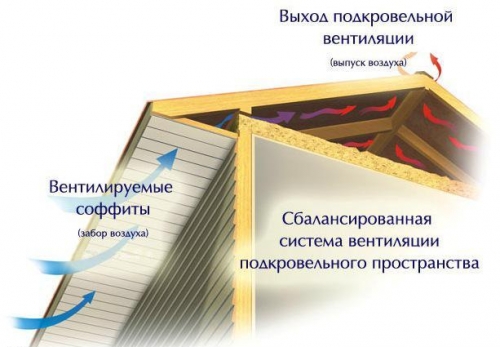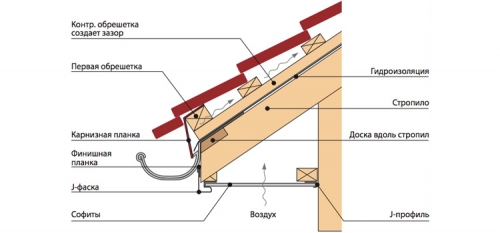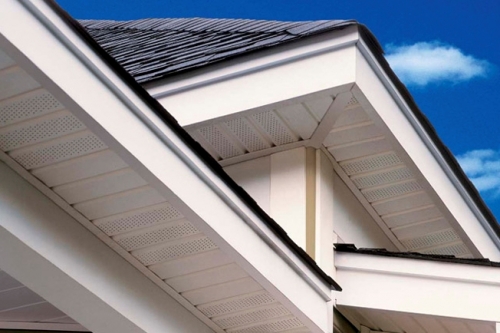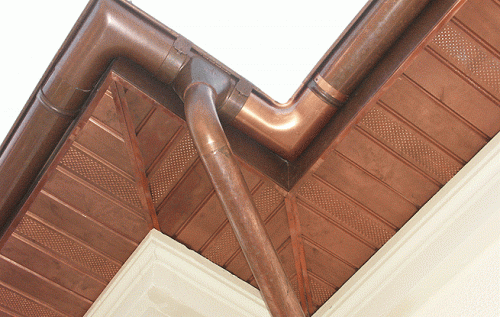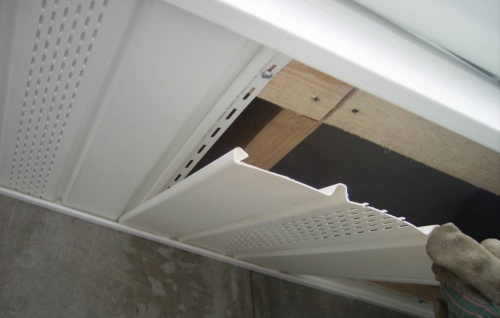In a modern city, it is difficult to imagine roads, the territory of organizations and enterprises, ...
|
|
Roof materials cannot be counted today. For every taste and wallet. Among them is special ... |
The concrete floor, along with other types of flooring, needs waterproofing. Concrete itself ... |
How to pick up the roof with sofita

The procedure for arranging the roof is not only the manufacture of the structure of the rafters, the direct laying of the roof covering and the installation of the gutters, but also the process of hemding its cornice. To do this, on the overhangs of pediments and cornices, a bearing from a wooden lining, a strict boards, vinyl or metal siding is performed. But today on sale there is a more convenient material for licking a roof called Sofita for the roof.
Content:
- The need for a roof bearing
- Sophite's concept for lurking
- The advantages of sofits for roofing
- Types of sofits for roofing
- Roofing procedure with sofitis
The need for a roof bearing
A properly built house requires that from the wall its roof went to a distance of at least 50-70 centimeters to ensure the protection of the facade walls from rain water. In this case, an overhang is formed in the roofing plane, which is covered with the roof material on top, and is filled with below. Having hung the roofs, not only will help to give the house a finished aesthetic look, but also solve the issue of roof ventilation in the space under the roof or between the heater and the roof material. This is especially true when installing the roof of the attic floor.
In suburban housekeeping, the most part is currently built by two types of attic and attic. Thermal insulation, in the case of a cold attic roof, is placed in the attic of the house, in the insulated attic between the rafters. Since the house is able to breathe, moist steam from the premises will pass through the insulation, although it should not linger in the thermal insulation layer. In this case, condensate is formed, and the properties of the insulation are worsening.
In addition to reducing the quality of the material, the elements of the subsystems of the wooden beams will begin to rotate from moisture, the metal parts will begin to corrode. Various waterproofing films play an important role in solving this problem, but it is important not to neglect the creation of ventilated roofing overhangs and providing traction for ventilation from the cornice to the ridge.
When fading the roof, Sofita is mounted with a gap of about 10 15 millimeters. In this case, the air flow thrust will be created, which comes from the lower overhang mark into the space under the roof, heats up gradually and rises to the ridge, after which it goes through the openings for ventilation. Thus, continuous air circulation and effective elimination of moisture are ensured, which allows the roof to remain dry. Good ventilation can extend the life of the roof, avoiding the appearance of fungus and mold.
The overhang is adopted not only for practical considerations to ensure good thrust in the under -wrapping space. This is still necessary to protect the roofing cake from the settlement of insects, birds and rodents, because no one would like to observe a similar picture.
Traditionally, the roof bearing was performed using a wooden lining. However, you should think about the disadvantages of wood it should be periodically treated with a special solution against decay and fungus, tinted. In addition, the lining is able to absorb moisture and black over time, so for a roof hem is not the best option.
The vinyl siding, which is intended for the walls of the facades, looks unattractive after the roof, its appearance will only worsen when making holes for ventilation, which is not initially provided. A galvanized metal siding is not protected from corrosion, and since it is placed on the overhange to the cornice, where condensate often accumulates, has a fairly low service life. Brown rust spots very quickly occur on this material, which are especially noticeable if the color of the roof is white or fairly light.
Fortunately, progress has not been on the spot for a long time, and now there is a more practical material for licking the roof roofs for the roof, which are distinguished by good visual compatibility with roofs, facade materials and germs, and are also characterized by a democratic price. In addition, the price of sofits for the roof is democratic.
Sophite's concept for lurking
In the construction industry, sophims are called panels designed for the lining of various horizontal surfaces, which are turned down. Sofites are the same siding or lining, but with a special structure that passes the air and does not prevent its free circulation, which allows you to protect the roof from dampness, fungus and mold. It is the presence of perforation that is the main difference between the sofites, which are used in the open air, from other decorative panels.
These panels are fixed to the box along the edge of the roof. The panels are joined with each other with a castle connection, allowing to hide their fasteners. The length of the joints is most often 3 - 3.6 meters, and the width is 22 - 30.5 centimeters. Certain sofits for the roof depend on the manufacturer. American and Canadian manufacturers often make a triple profile 30 centimeters wide and 3.6 linear meters long, which is considered to be the most optimal size for licking the roof. Sofites of domestic manufacturers can differ in dimensions.
Before you pick up the roof, you need to choose one of the three types of sofits:
- Solid. This material is impeccably suitable for lining the ceiling of your open veranda, porch or garden gazebo. Thanks to constant access to all the inner surfaces of the air roof, all open structures will not require repairs for a long period and retain an excellent look.
- Completely perforated, which are recommended to be used for roofs, which are covered with non -refined materials, for example, as a fold or bitumen tile. Perforated sofits are indispensable when fading the protruding parts of the roof: overhangs, cornices, skates, pediments and visors.
- With perforation in the center, which provides effective ventilation of space under the roof. At the same time, a composition with the alternation of two continuous stripes and one strip of perforation is formed on the overhang of the cornice. Regardless of the presence or absence of perforation, the cost of Sofit is the same.
The advantages of sofits for roofing
The indisputable advantages of sophists over traditional materials are their following properties:
- Mechanical strength - resistance to damage, blows and effects of atmospheric precipitation. At the same time, the constant appearance of the house is ensured throughout the entire period of use. They do not change their color and do not burn out under the influence of sunlight and high humidity, and also do not rot.
- Universality. Sofites can be lined in the room in the room and a subcutaneous space. The wide color scheme of the product allows them to combine them with various types of finishing and roofing materials, as in the photo of the sofits for the roof.
- Simplicity of care. Sofites do not need updating and painting throughout the entire period of operation. To recreate the appearance, they should be periodically washed with water with detergents.
- Impeccable appearance. Sofites can easily hide the wiring and various communications, and the castle connection allows you to hide the joints of the panels mounting and the facade components.
- Resistance to biological factors. Sofites, unlike facing materials that are made of wood, are not affected by a fungus and are not covered with mold.
- Lightness and ease of installation. Installation work due to the use of sophists can be carried out in any time and at a wide temperature range. Products do not crack and do not corrode at temperatures from minus 60 to plus 120 degrees Celsius.
- Environmental and fire safety. All sophites are made of non -toxic and non -flammable materials, which allows them to be used in special construction with increased fire safety requirements and resistance to aggressive influences.
Types of sofits for roofing
Let's look at what kind of sofits exist for the roof baking today.
Plastic sofitis
The most common species of Sofit is plastic, since its price is small. Vinyl sofites have good characteristics - they are wear -resistant, elastic, do not fade, resistant to sharp temperature drops, conveniently when installing, the roof is finished with plastic sofita almost without waste. Such products are white, brown and colored. White Sofit is an elegant, calm vinyl material, the cost of which is less than color and brown sophite.
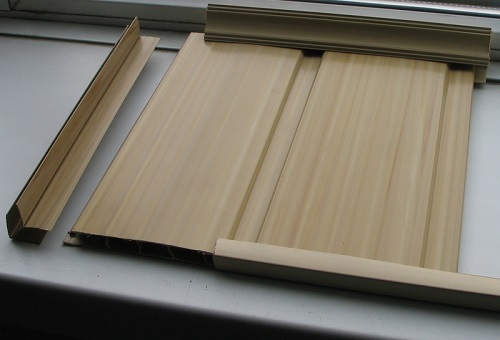
Brown sofits emphasize the nature and individuality of the house, because they are often suitable for the color of the roof, and are characterized by increased resistance to ultraviolet rays, since the sun acts stronger on dark surfaces. Color vinyl sofites occupy the cost of a golden middle between white and brown goods. It is often customary to use sofites complete with siding so that the cornice does not stand out against the background of the facade.
Steel Sofita
Metal sofitis is the most stable material that is used for overhanging overhang, and have a huge selection of colors. They perfectly withstand mechanical loads, are often supplied with the roof, as they are produced from polymers along with metal tiles. The guarantee of such a product, of course, surpasses all its competitors.
These sofits are perforated and without perforation, a metallic sophite bearing your home for many years of high -quality anti -corrosion protection. White, colored or brown products can be used on open verandas and arbors in the country. The cost of metal sophite for the roof is acceptable for the material of this quality.
Aluminum sofitis
Aluminum sophite today occupies a leading position on sales and nursing cornice overhangs, as it has established itself as a high -tech and practical material at a reasonable price. Sophite panels of this type are used in private construction and original architectural projects.
The light weight of aluminum sophites is a great advantage, it follows ease of installation, which allows even high -rise houses to be planted. If you started repairs or decided to give the facade a pristine look and hide defects, then perforated brown aluminum sophites are best suited for this. In addition, aluminum sophimal panels do not have the ability to expand at temperatures, like plastic.
Copper sofits
The roofing, the hem of which is made of copper, will last longer than other materials due to auto -storage of corrosion of the copper leaf and exemplary resistance to aggressive media - more than 100 years. Such sofits with each other are connected by a castle that hides the places of fasteners. Perforated copper sofits close horizontal spaces on the street, and without perforation are installed, as a rule, inside the rooms.
Copper sofites are quickly covered in the air with an oxide film, which gives them a characteristic yellowish-red tint. During operation, they become gradually brown, and then they become covered with atmospheric effects by a patina and acquire a malachite-green tint. Therefore, real connoisseurs of antiquity buy only copper.
Roofing procedure with sofitis
Before healing the roof with sofitis, it is necessary to insulate the walls of the house outside. This is most relevant for the most common boxes that are sewn not right along the rafters, but in a horizontal direction. The key to the successful hem of the overhang and cornices of the roof of the sophims is the right measurements, so before the start of the roof hem, make a high -quality drawing, which will help you navigate the overall information and sequence of action.
In itself, the procedure for installing sofitis is considered quite simple, but remember that they must fit into the general appearance of the house. The design of the box itself is individual, depending on the specific design of the roof, but there are two most popular options that include the general elements of the binding:
- Bearing on rafters, when a corner is selected for hem, which coincides with the slope angle. This technique is intended for the most part for roofs, which have a small angle of inclination, the installation of sofitis is carried out on the rafters parallel to the plane of the walls. If the lower plane of the rafters is not even, it must be leveled to ensure high -quality roofing. To do this, you can fasten on the sides of the rafters with screws by scraps of boards with a thickness of at least 4 centimeters, and at least 10 centimeters long. First, the first and last boards are screwed, between which the threads are pulled and the other boards are fastened. In the areas of the slopes of the slopes on all sides of the corner rafters, the boards are fastened.
- The most common is the solution when a horizontal box is installed to the wall from the edge of the rafters, the frame for lining the roof with sofitis is made of boards. The fastening of one edge is made to the lower part of the rafters, the second to the additional board, which must be lowered and attached at the place of touch of the rafters and walls. The board in the corners of the sloping of the slopes should be fitted flat, because in this place there will be a joint on which the ends of the boards are performed. Such a joint should pass to the angle of the walls of the walls of the slopes, as a result of which a rigid structure is formed independent of the wall. It is recommended to pay due attention to the reliability of the created mount, it can be made using screws, but it is better to use plates and corners of metal.
Installation of sofitis panels is made on such a crate. To fix the details of the Sofites to it, the screws should be used that are equipped with a press shame. To install the first strip of sofitis, it is necessary to determine the starting point of the installation, retreat from it by about 77 centimeters and horizontally beat off the line throughout the perimeter of your house.
The initial strip must be installed directly under it. To make corner elements and equip the edging, it is required to install the external and internal elements of sofitis. Make sure that the lower end is lower than the edge of the initial strip. It is recommended to mount corner parts on a self -tapping screw, other screws are installed in the middle part of the grooves. In this case, the openings should be surrounded by a edging or platband.
Details should be joined at right angles. Sofites are set to the top from the original strip. The details of the Sofites need to be joined in the castle. Before installing the last panel, install the final strip. Cut the wall panel until the desired length reaches and, holding the cut end in the last strip, mount the wall panel. It remains to pick up the cornices and overhang of the roof.
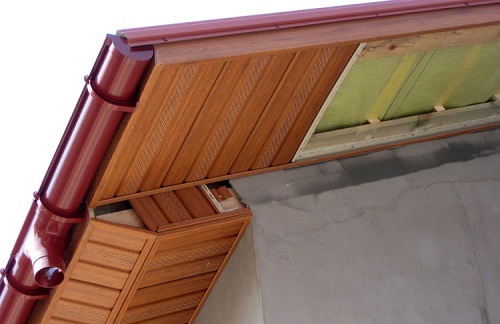
For high -quality installation of sofits for the roof, it is necessary to use nails: begin to clog them from the middle part of the panels of the sofitis towards the edges, but not to the end to avoid gaps. At the end, the panels using a circular saw should be cut. The action is carried out in low temperature mode. For trimming small parts, special scissors for metal are most suitable.
Thus, after the construction of the roof frame, it is imperative to make sofitis. Since rain, snow, cold, wind, insects, birds and rodents penetrate this section of the roof, it is recommended to choose material for the skin very carefully. Thanks to the emergence of such a material as Sofita, the roof bearing allows not only to protect itself from bad weather and its harmful influence, but also to solve the issue of high -quality ventilation in the space between the insulation and the roof.

